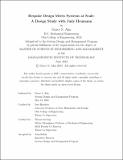| dc.contributor.advisor | Hendren, Sara | |
| dc.contributor.advisor | Seering, Warren | |
| dc.contributor.author | Ahn, Grace S. | |
| dc.date.accessioned | 2023-07-31T19:40:22Z | |
| dc.date.available | 2023-07-31T19:40:22Z | |
| dc.date.issued | 2023-06 | |
| dc.date.submitted | 2023-06-23T19:53:34.591Z | |
| dc.identifier.uri | https://hdl.handle.net/1721.1/151445 | |
| dc.description.abstract | This thesis documents a bespoke design process for disability; it also establishes its relevance to population-scale systems in caregiving and health technology spaces. As people with disabilities are the largest minority group and one of the most underrepresented in the world, it is crucial to recognize these unique challenges and address them through inclusive design practices. To do so, the study explores the sleep needs of Judy Heumann, a wheelchair user with evolving medical needs for assistive technology, and a world-renowned civil rights activist on disability inclusion. Heumann’s daily sleep routine involved thirty minutes of building an intricate elevation device to support her lower body. If any part of the device was not properly tuned to her comfort levels, Heumann was unable to sleep. The study utilizes design thinking methodologies to deliver a working prototype that meets her functional needs and alleviates recurring pain points. The final thesis deliverable is a bespoke prototype for Heumann, integrating concepts from biomedical technologies and custom home adaptations. The prototype resembles an intuitive-origami-like setup including adjustable and collapsible features for comfort and travel. By using a design-for-one framework, the final prototype meets Heumann’s material sleep needs and simultaneously reveals common pain points in systems where caregiving and health technology meet.
Concurrent to prototyping, the research expanded to other wheelchair users to investigate their overlapping and unique needs. Interviews revealed insightful latent needs and accompanying systems upstream and outside of the product context. This includes the economics and supply of human staffing while evaluating where smart home technology is heading. The aim of the thesis is to provide hybrid insights that blend technology and human services, where technology alleviates tedious burdens, and humans can be empowered in areas of connection and agency. | |
| dc.publisher | Massachusetts Institute of Technology | |
| dc.rights | In Copyright - Educational Use Permitted | |
| dc.rights | Copyright retained by author(s) | |
| dc.rights.uri | https://rightsstatements.org/page/InC-EDU/1.0/ | |
| dc.title | Bespoke Design Meets Systems at Scale: A Design Study with Judy Heumann | |
| dc.type | Thesis | |
| dc.description.degree | S.M. | |
| dc.contributor.department | System Design and Management Program. | |
| mit.thesis.degree | Master | |
| thesis.degree.name | Master of Science in Engineering and Management | |
